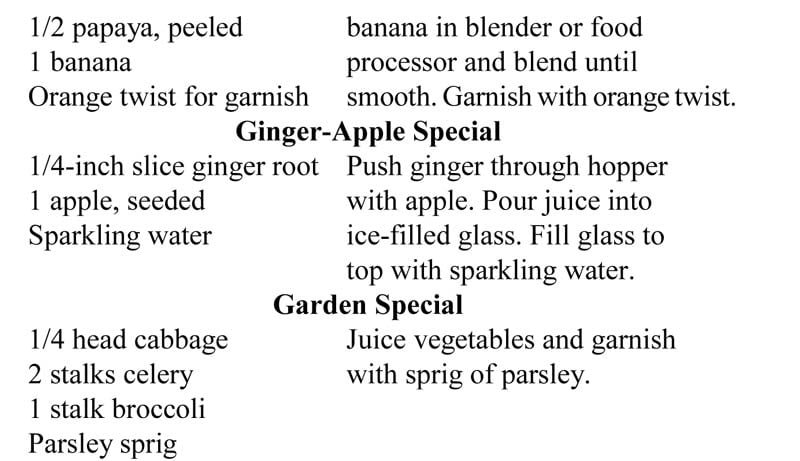The diseases indicated in the heading are very common. Anaemia generally grips women, while others are common to all.
Anaemia
Anaemia is a condition in which there is a reduction in the total number of red blood cells or volume of blood, or an abnormal size or shape of red blood cells. It is characterized by oedema, paleness, weakness, a tendency to tire easily, insomnia, irritability or depression and decreased resistance to infection. Iron is an important factor in anaemia, as the formation of red blood cells is impaired in those lacking sufficient amounts of iron.
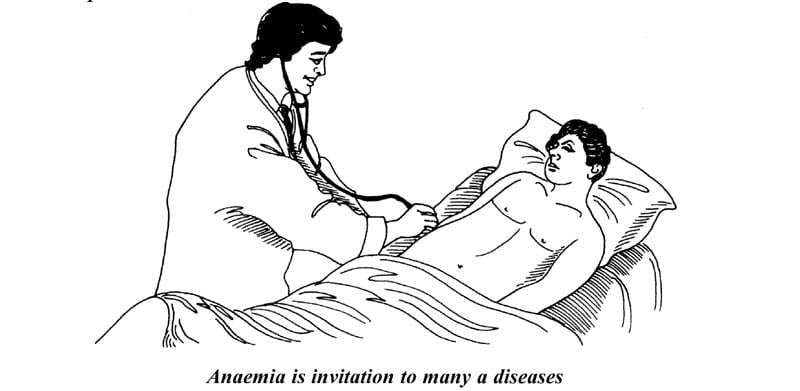
However, there are many causes of anaemia; iron deficiency is only one. Other deficiencies, including those of folic acid and Vitamin B 12, along with abnormal haemoglobin production as in sickle cell anaemia, may also cause this condition.
General Recommendations
Effective treatment of anaemia depends on the type of anaemia. The three most common types are iron deficiency, folic acid deficiency, and Vitamin B12 deficiency anaemia. Treatment involves supplying the body with the appropriate nutrients in an absorbable form. If you suspect you are anaemic, we suggest you seek medical advice.
Dietary Modifications
For all enemies, eat a diet high in green leafy vegetables; and their juices. Other iron-rich foods that should be consumed in quantity include beans, blackstrap molasses, dried apricots, raisins, almonds and shellfish. Vitamin C has been shown to significantly enhance the absorption of iron. The liver is the organ where toxins are stored. Eating liver today could do more harm than good. Black tea should also be avoided, because it contains tannins that can reduce iron absorption as much as 50 percent when taken with meals.
It is recommended that Vitamin B12 always be taken along with folic acid. Foods rich in folic acid include black-eyed peas, wheat germ, lean meat, beans, bran, asparagus, lentils, walnuts, spinach and kale. Foods rich in Vitamin B 12 include clams. oysters, sardines, egg yolks. trout. salmon, tuna and lean meat.
If a Vitamin B12 deficiency anaemia exists because of a lack of an intrinsic factor (a substance produced in the stomach), fairly large doses of Vitamin B12 are needed and medical supervision is recommended.
Nutrients That Help
Iron Deficiency Anaemia
1. Iron. 2. Vitamin C.
Folic Acid Deficiency Anaemia
1. Folic Acid. 2. Vitamin B 12.
Vitamin B12 Deficiency Anaemia
1. Folic Acid. 2. Vitamin B 12.
Beneficial Juices
Parsley, beet greens, and carrot-sources of iron.
Kale, parsley. and green pepper-sources of Vitamin C.
Asparagus, spinach, and kale-sources of folic acid.
There are no fruits or vegetables rich in Vitamin B 12. For strict vegetarians, Vitamin B 12 supplementation may be necessary. Or try eating Vitamin B 12-fortifted cereal two or three times a week.

Spring Tonic
Handful parsley Bunch up parsley and push
4 carrots, greens removed through hopper with carrots,
1 garlic clove garlic, and celery.
2 stalks celery
Constipation
Constipation occurs when there is infrequent defecation, difficulty passing stools, or unduly hard and dry stools. Frequency of bowel movements varies and there is no professionally agreed upon frequency. But most nutritionally oriented physicians sugges one to two bowel movements daily. When fecal matter remains in the colon too long, harmful substances from bowel bacteria can contribute to many ailments, including flatulence, cellulite, hernias, hemorrhoids, varicose veins, indigestion, obesity, diverticulitis, insomnia, halitosis, headaches, and colorectal cancer. Chronic constipation has been associated with a higher incidence of colon cancer as well.
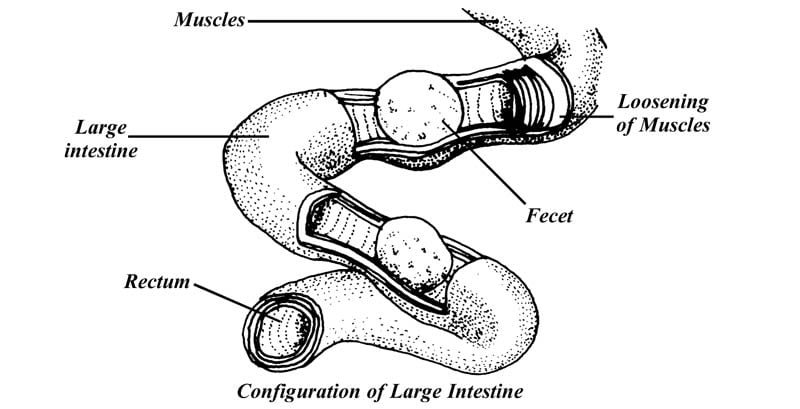
Constipation can be caused by poor dietary habits, insufficient fluid intake, food sensitivities, a sedentary life-style, lack of exercise, pregnancy, advanced age, iron tablets, certain drugs, metabolic disorders, endocrine problems, obstructions, bowel diseases, psychogenetic disorders, insecticide exposure and overuse of laxatives.
General Recommendations
Two types of constipation have been identified: atonic (lazy bowel) and spastic (narrowing of the colon with small, ribbon like stools). For atonic constipation, a high-fiber diet with increased fluid intake is recommended. Also, bowel retraining is needed after constipation has been eliminated. There are four rules to follow in the retaining process. First, don’t suppress the urge to defecate. Second, schedule regular times to sit on the toilet each day. Third, exercise at least four times per week for a minimum of 20 minutes each time. Fourth, discontinue the regular use of laxatives and enemas. (Mineral oil is not recommended at any time, since it interferes with fat-soluble Vitamins.) The best approach is to train bowels to function independently.
Spastic constipation can be caused by an obstruction. See your doctor to rule out such complications. A more common cause is nervousness or anxiety. Relaxation exercises and positive thoughts can be very helpful.
Dietary Modifications
Numerous studies have shown the benefits of a high-fibre diet in the prevention and treatment of constipation. Conversely, a low-fiber diet can cause constipation. Increase your consumption of fresh fruits and vegetables, legumes, whole grains, seeds and nuts. Particularly effective are foods containing cellulose-grains, fruits, vegetables, and seeds-because of their bulking capacity. Bran is the most concentrated form of cellulose fiber. You can start by eating one tablespoon of bran per day, and gradually increase your intake to five or six tablespoons daily. But be aware! Too much bran can reduce your body’s ability to absorb calcium, magnesium, Iron, and zinc.

- Avoid constipating foods and drinks including cheese, fried foods, sweets, white flour, salt, junk food, beef, pasteurized milk, wine, carbonated drinks and coffee.
- For spastic constipation and vegetable juices are an excellent means of obtaining adequate nutrients.
- Psyllium seed husks make a safe laxative. Mix one or two rounded teaspoons in a glass of water and take after meals. Prunes and prune juice contain a laxative substance found to stimulate intestinal movement. Apples also have a laxative effect.
- Take Lactobacillus acidophilus or megadophilus to restore friendly bowel bacteria. Overuse of laxatives and enemas can remove the beneficial bacteria and contribute to constipation.
- Juice fasting for several days can be very beneficial.
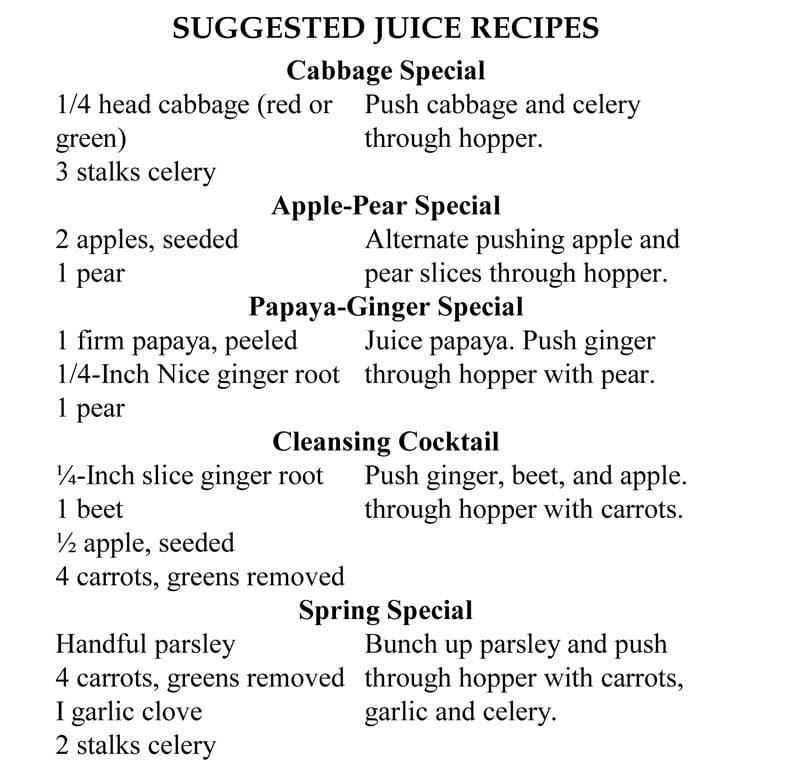

Nutrients That Help
Folic acid is beneficial if a deficiency exists.
Thiamin (Vitamin B1) is beneficial if a deficiency exists.
Beneficial Juices
Spinach, kale, beet greens and cabbage—sources of folic acid.
Garlic-contains appreciable amounts of thiamin. (Thiamin is found primarily in seeds, nuts, beans, and whole grains.)
Prune, pear, and apple—have a laxative effect.
Diarrhoea
Diarrhoea is characterized by frequent, watery bowel movements. Other symptoms can include cramping and abdominal pain. Most commonly a symptom of gastrointestinal disturbances, diarrhea can also indicate more serious disorders such as dysentery, ulcerative colitis, or Crohn’s disease.

Diarrhoea can be categorized as functional (due to stress or irritation)— organic (due to intestinal lesion); osmotic (due to fat, lactose, simple carbohydrate, or gluten intolerances, artificial sweeteners; or excessive Vitamin C intake); or secretory (due to viruses, bacteria. bile, acids, hormones, or laxatives). Secretory diarrhoea is the most serious. Chronic diarrhoea has been shown to be a common symptom of food allergies.
General Recommendations
Over-the-counter medications to stop diarrhoea are not recommended. Your body may be ridding itself of toxic substances. If there is blood in the stool, the stools appear like black tar, or the situation persists for more than two or three days, see your doctor. If you experience chronic diarrhoea (frequent recurrences), we recommend testing for food allergies.
Dietary Modifications
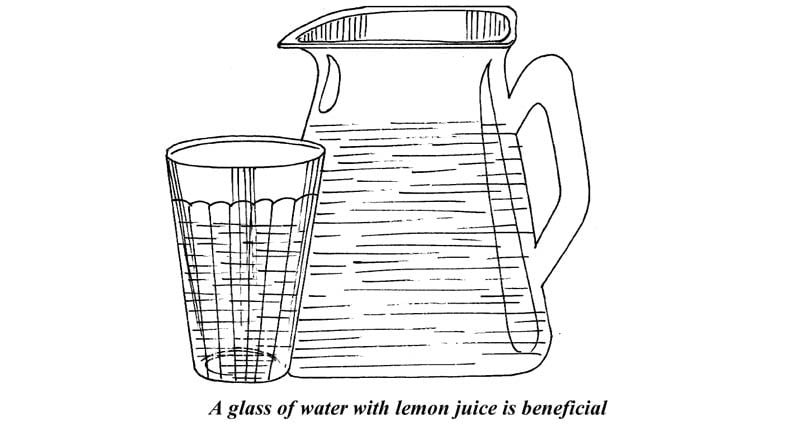
- Drink plenty of fluids to prevent dehydration. Dehydration is characterized by a dry mouth and/or wrinkled skin. Replace electrolytes (minerals) with fresh juices. Fruit juices should be diluted with water. Carrot and green juices contain abundant minerals that make good electrolyte replacers. A longused naturopathic remedy is to sip equal parts of sweet lime and tomato juice. Cabbage juice may be substituted for sweet lime juice, as substances in cabbage have been shown to heal intestinal lesions.
- Avoid coffee (which can aggravate diarrhea), alcohol, and carbonated beverages, as well as all cold foods and drinks. Digestion is assisted by warmth. Rice water is beneficial and can be prepared by boiling one-half cup brown rice in three cups of water for 45 minutes. Strain and drink three cups daily. Herbal teas such as chamomile, raspberry leaf, or blackberry leaf are helpful as well. Ginger Tea is useful for cramps and abdominal pain.
- While experiencing diarrhoea, it is advisable to avoid dairy products (except for plain yogurt) beans fats, wheat, or any food suspected to be allergenic, as well as all solid foods. Ibis is an appropriate time for a short Juice Fast. Remember, though, to drink mostly vegetable juices.
- As a supplement, try pectin, a soluble fither that has long been a natural remedy for diarrhea. Pectin forms a gel-like substance when mixed in water. Try one tablespoon three times a day.
- Take Lactobacillus to restore friendly bacteria in the bowel. One-half teaspoon of acidophilus or megadophilus is suggested three times a day.
- Follow the BRAT diet (banana, rice, apple, and tea) a traditional remedy for upset stomach and diarrhoea.
- As stools begin forming, reintroduce foods in small amounts. Soups, well-cooked brown rice, cream of brown rice cereal, plain yogurt, steamed vegetables and grated apples make good choices.
Nutrients That Help
- Folic acid supplementation may be helpful for chronic diarrhoea.
- Sodium can be lost in large quantities with diarrhoea.
- Potassium can be lost in large quantities with diarrhoea.
- Magnesium can be lost in large quantities with diarrhoea.
- Vitamin and mineral supplementation may be needed to replace lost nutrients.
Beneficial Juices
- Spinach, kale. beet greens and broccoli—sources of folic acid.
- Beet greens beet, spinach, celery and carrot—sources of organic sodium.
- Parsley, garlic, spinach, carrot and red cabbage—sources of potassium.
- Beet greens. spinach, parsley and beet—sources of magnesium.

